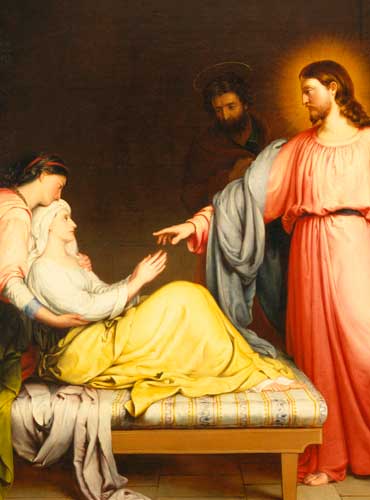Wednesday of the 1st Week of Ordinary Time – Option 2 – Mk 1:29-39
Today’s Gospel continues recounting Jesus’ ministry, and we’re presented with several episodes that give us a glimpse into Jesus’ life and work. What particularly catches our attention, however, is the healing of Simon’s mother-in-law. The whole event takes only three lines, but we can point out three details that shed light on who Jesus is and how He cares for His people, and then, reflecting, how we as His disciples should respond to that concern.
First, it’s note-worthy that Jesus should care at all about the mother-in-law. The first indication that something wasn’t right was probably when she didn’t come to meet her guests at the door and wait on them, as the culture demanded. As one scholar notes, “women did not hold a high position in Israel, and it is doubtful that a [typical] Pharisee would have paid much attention to the need in Peter’s house.”[1] Even more, these were new disciples, new students, as it were, of Christ the teacher; a typical teacher wouldn’t have cared very much for these brand new students, and even less for such poor ones, and far less for their relatives, and still less for a woman relative. Yet none of that matters to Jesus; to Him, everyone is a soul worth saving. He would have become man, and suffered His passion and death, even to save just one soul.
Second, notice the reaction of the disciples: “They immediately told [Jesus] about her.” That word immediately (εὐθέως – eutheós in Greek) has a broad meaning. It can mean at once or immediately in the sense of time, but the adjective it comes from means “straight,” that is, not crooked, “without unnecessary . . . detours, and figuratively it means to act without delay or straightway, taking a direct path . . . without any delays or hesitations.”[2] The disciples don’t waste their time worrying, or thinking of excuses for the mother-in-law, or even thinking of how they can solve the situation themselves. Rather, they bring her straight to Jesus in prayer.
Third, notice the care that Jesus takes of Simon’s mother-in-law. He could have healed her at a distance, or with a word, but He doesn’t. Rather, “He approached, grasped her hand, and helped her up.” However, note that it’s only then, when she was standing up, “that the fever left her.” In other words, she had to get out of bed, where she was as comfortable as she could’ve been, in order to be healed.
In our lives, too, we’re confronted with difficult moments and challenges. Yet, Jesus doesn’t leave us alone; on the contrary, He is deeply concerned about us, and wants us to turn immediately to Him in our needs, not worrying about them or getting worked up. Sometimes taking that step of trust might seem difficult, but it is really quite simple. All we have to do is carry out our duties faithfully, and trust.
Once, Saint Titus Brandsma was asked by his sister, a Poor Clare, “‘Brother, what must I do to become perfect?’ He replied, ‘Carry out your daily duties punctually, even to the smallest things. This is so simple! Follow Our Lord like a young girl and skip about behind Jesus; leave all your worries to Him; this way you’re doing enough, this is perfection—don’t tire yourself out, surrender yourself.’”
We can ask ourselves: do we really trust in Christ’s love for us? Do we really believe that He cares for us, and wants the best for us? Do we take all our needs and concerns immediately to Him, or do we sit and worry and wonder? Are we willing to surrender ourselves to God, giving up what is comfortable in order to give ourselves entirely to Him?
Today, through the intercession of Mary, Mother of the Word Incarnate, let us ask for the grace to trust in God’s love for us, and to surrender ourselves to Him and to His will.
[1] Warren W. Wiersbe, The Bible Exposition Commentary, 33.
[2] HELPS Word-studies: 2117 euthýs.





